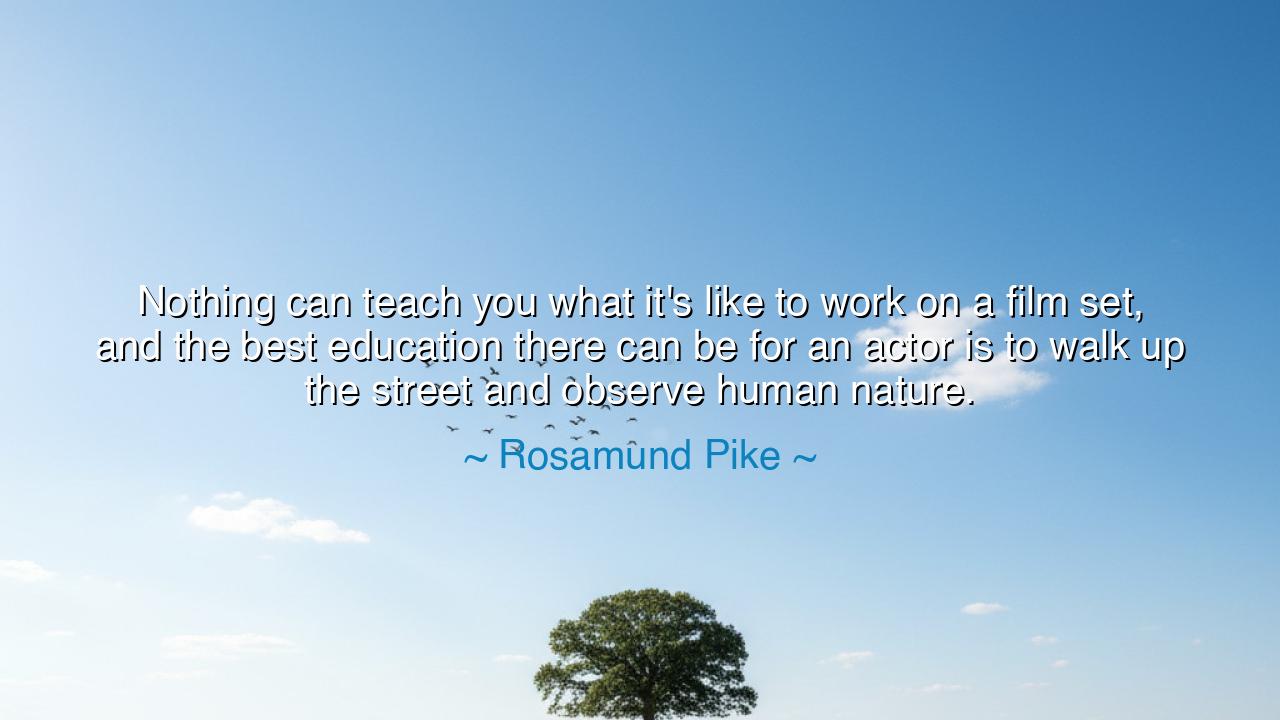
Nothing can teach you what it's like to work on a film set, and
Nothing can teach you what it's like to work on a film set, and the best education there can be for an actor is to walk up the street and observe human nature.






When Rosamund Pike, the luminous English actress known for her depth and quiet precision, said, “Nothing can teach you what it's like to work on a film set, and the best education there can be for an actor is to walk up the street and observe human nature,” she was not speaking only to the craft of acting. She was unveiling a timeless truth about learning, experience, and the study of humanity itself. Beneath her words lies a wisdom that transcends the theater and the camera—a wisdom as old as philosophy itself: that the truest knowledge does not come from books or institutions, but from living observation, from immersing oneself in the world and witnessing the infinite expressions of the human heart.
To understand the origin of this quote, one must look to Rosamund Pike’s own journey. Trained at Oxford, she entered the world of acting not merely with intellect, but with curiosity. She discovered, through years of practice, that no amount of academic preparation could replace the lessons learned on the film set—the crucible of collaboration, chaos, and truth. There, she found that acting was not simply reciting words, but capturing life in its rawness—anger, longing, fear, and joy. And where did she find the material to understand such emotions? Not in classrooms, but in the streets, among people. She learned, as the ancients once did, that the world itself is the greatest stage, and human nature, the most profound of all scripts.
“Nothing can teach you what it's like to work on a film set”—in this first truth, Pike speaks of experience as the ultimate teacher. Theory can describe the structure of art, but it cannot reveal its soul. Just as one cannot learn to swim from reading about water, one cannot understand performance until one stands before the lights, feels the tension of the crew’s gaze, and hears the silence that falls before “action.” The ancients understood this too. Aristotle taught that wisdom begins in experience—that it is through doing that knowledge becomes real. The sculptor learns the resistance of marble only when the chisel strikes; the warrior understands courage only in the clamor of battle. So too does the actor discover truth only when she stands before the living lens, her emotions stripped bare before the eye of art.
But Pike’s deeper insight lies in the second half of her reflection: “The best education there can be for an actor is to walk up the street and observe human nature.” Here she reveals a philosophy that extends beyond performance into the realm of life itself. To observe human nature is to practice empathy—to step beyond one’s self and enter into the vast ocean of other lives. The street becomes a sacred classroom, filled with teachers who do not know they are teaching: the weary mother at the bus stop, the anxious youth pacing in thought, the old man who smiles at nothing and everything. To study these fleeting gestures is to understand the rhythm of the human spirit. The ancients called this gnōthi seauton—“Know thyself.” But in truth, to know oneself, one must first see the reflection of humanity in others.
A story from history mirrors Pike’s wisdom. The great playwright Anton Chekhov, himself a physician before he was a dramatist, spent years tending to the sick and poor in the Russian countryside. From them, he learned not only the language of suffering, but the poetry of endurance. His plays—The Cherry Orchard, Uncle Vanya, Three Sisters—were not born from artistic theory, but from his observation of human nature in its purest form. He watched how people spoke when they were tired, how they lied when they were afraid, how they loved even when broken. This quiet witnessing became the foundation of modern acting and storytelling. Pike’s philosophy follows that same lineage: that the actor’s greatest power is not pretense, but perception—the ability to see truly, and through that, to reveal truth.
In this, there lies a profound lesson for all people, not only actors. We live in an age where knowledge is abundant but understanding is scarce. We mistake information for wisdom, and performance for authenticity. Pike’s words remind us to slow down—to look, to listen, to learn from life itself. Whether one is an artist, a teacher, or a leader, the deepest education comes from observation without judgment, from walking among others and seeing the world as it is, not as we expect it to be. In that seeing, we discover empathy; in empathy, wisdom; and in wisdom, humanity.
So, let this truth be carried forward like a lantern through the ages: Experience is the great teacher, and humanity is the great text. Do not seek mastery in solitude or perfection in theory. Go forth into the streets, the markets, the quiet corners of life. Watch how people move, how they smile, how they falter. Learn from their silences as much as from their words. For in understanding others, you begin to understand yourself—and in understanding yourself, you learn how to live truthfully, whether upon the stage or in the vast theater of existence.
Thus, in the spirit of Rosamund Pike’s wisdom, remember this: education is not confined to classrooms, nor is artistry confined to art. Every encounter, every expression, every soul you pass on the street is a fragment of life’s great story. Observe it with reverence. Learn from it. Let it shape you. For in that act of seeing—honest, humble, and human—you will find not only the art of acting, but the art of being.






AAdministratorAdministrator
Welcome, honored guests. Please leave a comment, we will respond soon